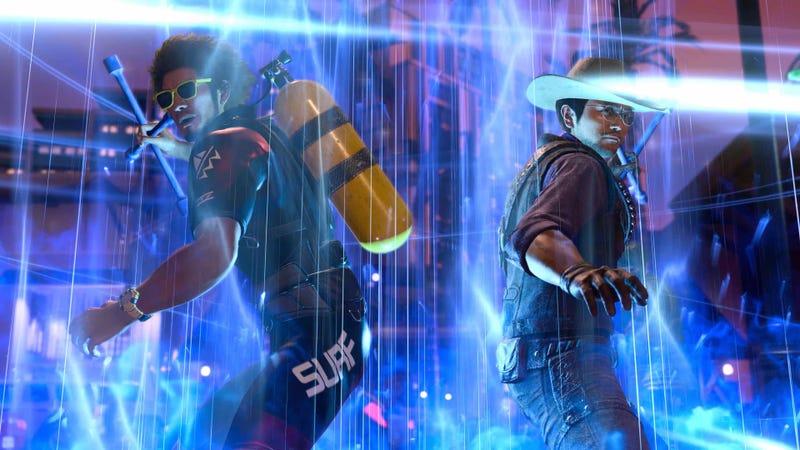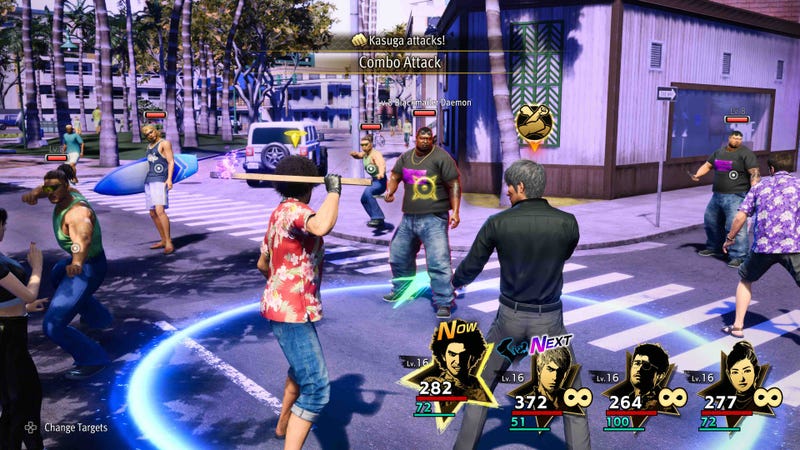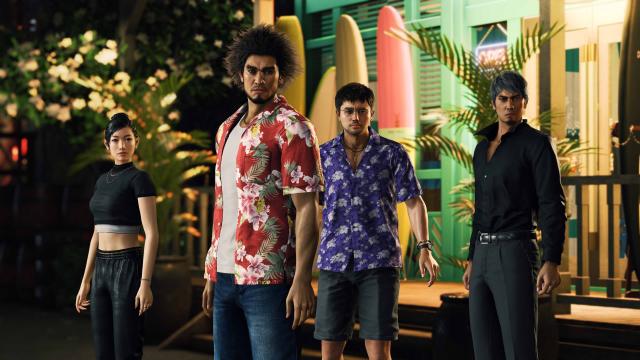Once upon a time, not so very long ago, the first couple of months of the year were a dead zone for new game releases. Typically, publishers rushed to get their shiny new titles out in time for the holiday gift rush. But then some clever genius realized that people buy games all year round. 2023 kicked off with a series of bangers—Hi-Fi Rush, Dead Space, and Resident Evil 4. And it looks like fans of iconic Japanese franchises will be eating awfully good in winter 2024, with remakes of Persona 3 and FF7 in the offing, as well as a shiny new Tekken. But the first big launch in the pipeline is the ninth mainline installment of Sega’s Like A Dragon (née Yakuza) series: Infinite Wealth, out January 26.
Editor’s note: You are reading the Kotaku US preview of Like A Dragon: Infinite Wealth. Kotaku AU will have a full review of our own live later this month! — David.
Back in November, Ryu Ga Gotoku Studio head Masayoshi Yokoyama said that Infinite Wealth was the biggest game in the series yet. He described it to Japan’s Game Watch as a “monster-class game longer than anything we’ve made so far.” Eep. The series is known for its ostentatious helpings of optional content, and while main stories usually run around 20-30 hours, it’s awfully easy to double that playtime if you get sucked into minigames and sidequests. Do you have 80 hours to play a new Yakuza game? I sure don’t! But I’m sure I’ll manage to find it somehow.
Having spent several hours delving into various aspects of Infinite Wealth—exploring Waikiki, building an island paradise, and photographing semi-nude dudes—it is with a mix of excitement and dread that I tell you that this is indeed a massive, massive game. I can’t tell yet if it’s too much of a good thing, but I can say there are far worse ways to spend the dreariest month of the year than getting into trouble in Hawaii.

Island time
Like a Dragon: Infinite Wealth takes place a couple of years after the events of Like a Dragon, the hilarious and gripping 2020 game that saw the series make a hard pivot from action RPG to plain-old, straight-up RPG. This time, our fluffy-haired hero Ichiban heads to the Aloha State in search of his long-lost mother. There, he meets up with longtime series protagonist Kiryu, shortly after the events of The Man Who Erased His Name. At the end of the November 2023 sidequel, Kiryu seemingly leaves Japan behind for good for a well-earned retirement in Hawaii. He’s there—at least partly—to moon over his long-dead love Yumi, who died in the very first Yakuza and, as far as I can recall, hasn’t been mentioned all that often since.
How any of this relates to the concept of “infinite wealth” remains unclear to me.
What is clear, however, is how the sunny open spaces of Waikiki manage to breathe new life into the established Yakuza formula. The series’ usual vicey haunts are (wonderfully!) cramped, dark, and seedy. But the low-rise open spaces of Hawaii feel like a natural evolution of the more expansive urban environments we saw in 2020’s Like a Dragon. As Ichiban, you can amble into souvenir shops and cruise through hotel lobbies, straight onto the beach and into the water. Drop-top sports cars will honk at you if you bumble aimlessly into the street, and bikini babes will saunter by, cheerfully waving back if you toss them a shaka sign. You can seemingly befriend many random NPCs in Infinite Wealth simply by saying hello, though at this point, it’s not entirely clear what the point of this mechanic is other than vibes. And I can confidently say the vibes are immaculate.

A little help from my friends
It wouldn’t be Like a Dragon without a gaggle of musclebound toughs itching to pick a fight with you at any given moment, and Infinite Wealth is no exception to this rule. But this time, they all speak with Standard American Meathead Voice and call you “bitch” a lot. This, admittedly, is pretty funny. That said, the English voiceover was the default for my demo, which felt very strange to me during dialogue or story sequences with the core cast, as I prefer my Yakuza with subtitles. (Your mileage may vary.) To my chagrin, I tried on several instances to change this and was not able to. I expect this will not be an issue in the full game, but I could not stop noticing it throughout the demo, like I’d left the price tag in the collar of my shirt.
Another thing. Street fights fit the context of being outside a bar late at night, when everyone is drunk and pissy. They do not make a great deal of sense outside the ABC Store at 11am when everyone is wearing bathing suits. All this is to say that as much as I’m digging the luxury resort setting of Infinite Wealth, it can feel conspicuously at odds with the whole “walk around and fuck people up” gameplay loop. A man just bludgeoned me with a surfboard—maybe this is not a good time to buy your kid a shave ice! Hopefully, I’ll get used to it in the full game—or there’ll be a clearer reason why all the tourists seem so unfazed by the mayhem unfolding just a couple of chaise lounges over.
Speaking of fighting, my demo of Infinite Wealth came around roughly the same time as I was also playing The Man Who Erased His Name. That game excelled at rapid-fire brawls against huge mobs of goons, with Kiryu’s new Agent skills allowing him to wrangle crowds with ruthless efficiency. The Dragon Quest-inspired, turn-based rhythms of Infinite Wealth feel far more deliberate and strategy-driven by comparison. For one thing, you won’t be taking on dozens of foes at once, but a handful here and there. There are loads of new party members, jobs, and abilities for you to dive into and customize your team’s approach to combat. There are also plenty of elemental affinities to exploit, and your party can interact with objects in the environment for bonus damage.

As an old-school RPG fan, I deeply appreciated that 2020’s Like a Dragon actually made status ailments useful, and I’m pleased to see that’s still the case in Infinite Wealth. Unlike the Yakuza games with Kiryu at the helm, you have to be more aware of your enemy’s specific strengths and weaknesses, and be able to change up your approach on the fly. (If you’re itching to let loose and hit someone with a giant parking cone, Kiryu’s special attack basically allows him to briefly be played in beat-‘em-up mode.)
As the culmination of my half-day island getaway, I was thrown into a late-game clash against a massive great white shark, the Tyrant of the Tides. While I would not personally attempt to punch a snarling shark that’s roughly the size of a private jet, Ichiban and his pals are made of stronger stuff. After taking a few lumps and pulling off a couple of last-ditch heals, I remembered that old familiar Final Fantasy and Dragon Quest logic and scrolled through my party members’ abilities to find anything that remotely sounded like lighting. Of course! All fish are weak to electricity. Even 40-foot sharks. Duh.
But apart from the really enormous shark, the parts of Infinite Wealth that really stuck with me are harder to talk about without getting into spoiler territory. When I’ve evangelized about this series to friends and colleagues in the past, I’ve advised them not to worry about the story too much, and just let the batshit experience wash over them. Spending a few hours with the latest game in the series has made me realize that—oh no—I’m more invested than I thought. I’m too invested. This Hawaiian-style instalment and The Man Who Erased His Name are telegraphing a “seriously, for real this time” torch-passing from Kiryu to Ichiban, and I don’t think I can handle it.
What if the real Infinite Wealth was the friends we made along the way?
Like a Dragon: Infinite Wealth launches January 26 on PlayStation, Xbox, and PC.

Leave a Reply